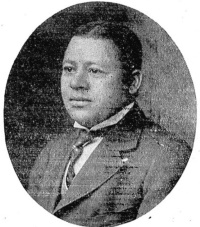

James Thomas Carter (13 February 1874–19 November 1959), attorney and business leader, was born in Richmond and was the son of Elsie Russell Carter and William Henry Carter, a shoemaker and watchman. He attended Richmond public schools but quit during his teens to help support his family. At age sixteen Carter went to work as driver, personal attendant, office assistant, and porter for George Llewellyn Christian, a prominent Richmond attorney and retired judge who had lost his left foot and part of his right heel in Confederate military service. Impressed with the importance of education to an urban-dwelling African American, Carter in the mid-1890s received private instruction in bookkeeping, shorthand, and typing from white teachers at the Smithdeal Business College, in Richmond. After Carter completed the course, Christian promoted him to full-time bookkeeper, stenographer, and typist for his law firm. Carter was then the only African American holding such a responsible position in a leading firm of white Richmond lawyers. Carter worked for Christian for about twenty years.
On 29 November 1900 Carter married Mary Elizabeth Harper. Later an influential civic leader, especially in the causes of social work and domestic training, she was education and industrial secretary of the Phyllis Wheatley Branch of the Young Women's Christian Association from 1928 until her death on 3 November 1931. She earned a B.A. in education at Virginia Union University in June 1927 and at the time of her death taught industrial relations at the university's Francis J. Torrance School of Race Relations. The Carters' only child, a son, died in August 1927, shortly before he was to enter the law school of the University of Michigan.
Following his marriage, Carter began reading in Christian's law library during his free time. He honed his legal knowledge by taking a correspondence course administered by instructors at the University of Richmond and the University of Virginia. In 1916 Carter passed the state bar examination and was one of only a few who passed in all subject areas on his first attempt. His law practice attained similar success. Many Black-owned corporations in central Virginia, including the Commercial Bank and Trust Company, employed him as attorney, and in 1918 he became general counsel of the Southern Aid Society of Virginia, the oldest African American insurance company in the United States. In April 1921, following the sudden death of the company's president, the board elected Carter the society's fourth president. His reputation in the Black business community soared, and the following year the stockholders of the Commercial Bank and Trust Company elected Carter president of the bank. In 1931, after Commercial merged with and became Consolidated Bank and Trust Company, he served as vice president, and later he sat on the board of directors.
For fifteen years before 1929 Carter had held office, including grand treasurer, in the Improved Benevolent and Protective Order of Elks of the World. In that year he formed a renegade Virginia branch with the same name. The original order, maintaining that it held rights to the name, successfully sued Carter and three associates, and Carter's Virginia chapter lost its charter. Nevertheless, Carter remained active in benevolent and social organizations as well as in the legal and business communities. His appointment in June 1935 as vice supreme master of the National Ideal Benefit Society made front-page news in the Richmond Planet. At various times he was a Freemason and member of the National Association for the Advancement of Colored People, the Urban League, and several other fraternal and service organizations; he was also chairman of the board of Richmond Community Hospital, a director of Bankers' Fire Insurance Company, of Durham, North Carolina, and superintendent of the Sunday school at Second Baptist Church, of which he was a member for more than sixty years. During World War II, Carter served as an adviser for the Selective Service Questionnaire Board and as a commissioner in chancery of the court of law and equity in Richmond. In 1941 Virginia Union University awarded him an honorary law degree.
James Thomas Carter was still president and general counsel of the Southern Aid Society when he died in Richmond on 19 November 1959. He was buried in the city's Evergreen Cemetery.
Sources Consulted:
Biographies in Joseph J. Boris, ed., Who's Who in Colored America, 2d ed. (1928/1929), 72, and M. S. Stuart, An Economic Detour: A History of Insurance in the Lives of American Negroes (1940), 233–234 (portrait facing 230); Birth Register, Richmond City, Bureau of Vital Statistics (BVS), Commonwealth of Virginia Department of Health, Record Group 36, Library of Virginia (LVA); variant birth date of 13 Feb. 1875 in index to Richmond City Department of Public Health Birth Records; BVS Marriage Register, Richmond City; one Carter letter, 14 Nov. 1931, in Lucy Randolph Mason Papers, Operation Dixie: The C.I.O. Organizing Committee Papers, 1946–1953 (1980 microfilm); Southern Aid Society of Virginia Records, Acc. 36805, LVA; Richmond Planet, 30 Apr. 1921, 18 Feb. 1922 (portrait), 13 Aug. 1927, 15 June 1935; Richmond News Leader, 4 Nov. 1931; obituary of wife by Lucy Randolph Mason in Richmond Times-Dispatch, 5 Nov. 1931; Charles H. Wesley, History of the Improved Benevolent and Protective Order of Elks of the World, 1898–1954 (1955), 227–229; John A. Cutchins, Memories of Old Richmond (1881–1944) (1973), 120; obituaries in Richmond News Leader and Richmond Times-Dispatch, both 20 Nov. 1959; obituary and account of funeral in Richmond Afro American, 28 Nov. 1959
Photograph in Richmond Planet, 18 Feb. 1922.
Written for the Dictionary of Virginia Biography by Alexander H. Lorch III.
How to cite this page:
Alexander H. Lorch III, "James Thomas Carter (1874–1959)," Dictionary of Virginia Biography, Library of Virginia (1998– ), published 2001 (http://www.lva.virginia.gov/public/dvb/bio.asp?b=Carter_James_Thomas, accessed [today's date]).
Return to the Dictionary of Virginia Biography Search page.


